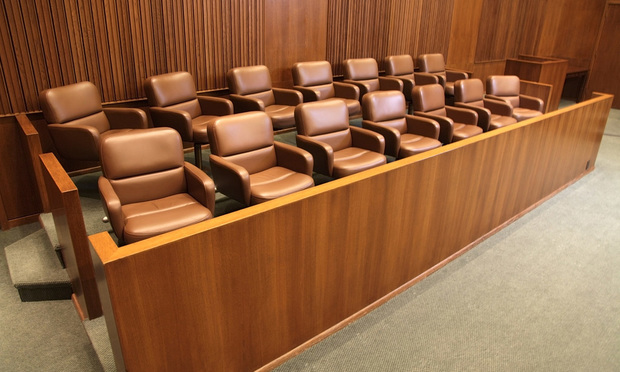In Strange Case of Verdict Slip That Revealed Too Much, Justices Reinstate $2.1M Award
The Pennsylvania Supreme Court has reinstated a $2.1 million jury award that mistakenly included compensation for future wage loss, finding that the defendant waived its right to challenge the verdict by failing to object at several intervals during trial.
December 05, 2018 at 06:08 PM
5 minute read
 Photo: Jason Doiy
Photo: Jason Doiy
The Pennsylvania Supreme Court has reinstated a $2.1 million jury award that mistakenly included compensation for future wage loss, finding that the defendant waived its right to challenge the verdict by failing to object at several intervals during trial.
The court ruled 5-2 in Stapas v. Giant Eagle to reverse a Superior Court decision that tossed out the verdict for plaintiff John Stapas, who was disabled as a result of a shooting outside a GetGo convenience store, and granted a new trial on damages to Giant Eagle, corporate owner of the GetGo chain.
The Allegheny County jury in Stapas had been instructed by the trial judge to return a single sum verdict, but instead it noted the breakdown of damages on the verdict slip—including $1.3 million in future wage loss, despite the fact that Stapas did not seek or prove those damages.
On appeal, the Superior Court agreed with Giant Eagle's argument that it was entitled to a new trial on damages because the jury's future wage loss award for Stapas undermined the entire verdict, and the jury did not follow instructions to provide a lump sum verdict.
But Justice Sallie Updyke Mundy, writing for the majority in a Nov. 21 opinion, said Giant Eagle was required under the state Supreme Court's 1974 ruling in Dilliplaine v. Lehigh Valley Trust to lodge a contemporaneous objection to the verdict itself and any errors that preceded the verdict during trial.
“Giant Eagle had multiple opportunities to preserve this ground for post-trial relief during the trial court proceedings but failed to do so,” Mundy said. “Specifically, Giant Eagle did not request a point for charge limiting wage loss to only past wage loss, did not object to the jury interrogatory listing 'wage loss' as a category of damages, and did not object to the trial court's damages instructions. Additionally, Giant Eagle did not object to the jury's verdict in which the jury specified that it awarded Stapas $1,300,000.00 for future wage loss. When the trial court's tipstaff read the jury's itemized verdict, Giant Eagle had a basis to object because the verdict did not conform to the trial court's instruction to return a single, lump-sum verdict and because the jury awarded damages for future lost wages, a category of damages that Stapas was not entitled to as a matter of law. By failing to raise an objection at any point during the trial before the jury was discharged, Giant Eagle waived its challenge to the jury's verdict.”
Mundy also rejected Giant Eagle's characterization of its challenge to the verdict as a weight of evidence challenge. Mundy said such a challenge ripens after the verdict because it centers on the jury's resolution of competing evidence.
“In this case, Stapas did not present any evidence of future lost wages and further acknowledged in his closing argument that he was not seeking damages for future lost wages,” Mundy said. “There was no competing evidence on future lost wages for the jury to weigh, and that issue was not ripe for the jury's consideration. Instead, Giant Eagle's position is that the jury could not award damages for future lost wages as a matter of law. Therefore, we conclude Giant Eagle's challenge to the verdict is not a challenge to the weight of the evidence and thus its failure to object to the jury instructions, damages interrogatory, and jury verdict waived the grounds raised in its post-trial motion.”
Mundy was joined in the majority by Justices Max Baer, Debra Todd, Christine Donohue and David Wecht.
Justice Kevin Dougherty, joined by Chief Justice Thomas Saylor, penned a dissent, arguing that Giant Eagle's challenge to the verdict was indeed a weight of evidence challenge.
Dougherty noted that, according to the Supreme Court's 1994 ruling in Commonwealth v. Brown, such a challenge should give rise to a new trial only where “'the jury's verdict is so contrary to the evidence as to shock one's sense of justice and the award of a new trial is imperative so that right may be given another opportunity to prevail.'”
The facts of the Stapas case met that high standard, Dougherty contended.
“This was not a case of mere conflict in testimony which the jury resolved based on credibility; rather the jury's award was so completely unmoored to the evidence it was the rare verdict that actually 'shocks the conscience,'” Dougherty said. ”Moreover, I cannot detect any trial court error which might have been cured by contemporaneous objection.”
Dougherty also questioned whether the justices should have granted allocatur in the case in the first place.
“Couching the issue before the court as a legal question regarding waiver principles, the majority employs a de novo standard of review, and considers the underlying factual question based on the cold record,” Dougherty said. ”The majority's analysis is tantamount to error review in a unique and fact-bound matter where the decision will likely muddy the waters and engender confusion in what was heretofore a clearly established area of law.”
Stapas' attorney, Michael Murphy of Ogg Murphy & Perkosky in Pittsburgh, said he was “gratified” by the waiver finding and added that his position was that even if a contemporaneous objection had been made, the jury still ultimately would have awarded the same amount.
Counsel for Giant Eagle, Scott Livingston of Marcus & Shapira in Pittsburgh, said he and his client filed a motion for reconsideration with the Supreme Court on Dec. 4, disputing the majority's position that there was no evidence on future wage loss introduced at trial.
Livingston said the motion for reconsideration also argues that the ruling will cause confusion going forward for attorneys challenging jury verdicts because it seems to require them to now make a split-second decision on whether to lodge an objection before the jury is discharged, rather than wait to file a post-trial motion.
(Copies of the 17-page opinion in Stapas v. Giant Eagle, PICS No. 18-1451, are available at http://at.law.com/PICS.)
This content has been archived. It is available through our partners, LexisNexis® and Bloomberg Law.
To view this content, please continue to their sites.
Not a Lexis Subscriber?
Subscribe Now
Not a Bloomberg Law Subscriber?
Subscribe Now
NOT FOR REPRINT
© 2025 ALM Global, LLC, All Rights Reserved. Request academic re-use from www.copyright.com. All other uses, submit a request to [email protected]. For more information visit Asset & Logo Licensing.
You Might Like
View All

Pa. High Court to Decide Whether Flight in a High Crime Area Can Result in an Investigative Stop
6 minute read
Lackawanna County Lawyer Fails to Shake Legal Mal Claims Over Sex With Client
3 minute readTrending Stories
- 1States Accuse Trump of Thwarting Court's Funding Restoration Order
- 2Microsoft Becomes Latest Tech Company to Face Claims of Stealing Marketing Commissions From Influencers
- 3Coral Gables Attorney Busted for Stalking Lawyer
- 4Trump's DOJ Delays Releasing Jan. 6 FBI Agents List Under Consent Order
- 5Securities Report Says That 2024 Settlements Passed a Total of $5.2B
Who Got The Work
J. Brugh Lower of Gibbons has entered an appearance for industrial equipment supplier Devco Corporation in a pending trademark infringement lawsuit. The suit, accusing the defendant of selling knock-off Graco products, was filed Dec. 18 in New Jersey District Court by Rivkin Radler on behalf of Graco Inc. and Graco Minnesota. The case, assigned to U.S. District Judge Zahid N. Quraishi, is 3:24-cv-11294, Graco Inc. et al v. Devco Corporation.
Who Got The Work
Rebecca Maller-Stein and Kent A. Yalowitz of Arnold & Porter Kaye Scholer have entered their appearances for Hanaco Venture Capital and its executives, Lior Prosor and David Frankel, in a pending securities lawsuit. The action, filed on Dec. 24 in New York Southern District Court by Zell, Aron & Co. on behalf of Goldeneye Advisors, accuses the defendants of negligently and fraudulently managing the plaintiff's $1 million investment. The case, assigned to U.S. District Judge Vernon S. Broderick, is 1:24-cv-09918, Goldeneye Advisors, LLC v. Hanaco Venture Capital, Ltd. et al.
Who Got The Work
Attorneys from A&O Shearman has stepped in as defense counsel for Toronto-Dominion Bank and other defendants in a pending securities class action. The suit, filed Dec. 11 in New York Southern District Court by Bleichmar Fonti & Auld, accuses the defendants of concealing the bank's 'pervasive' deficiencies in regards to its compliance with the Bank Secrecy Act and the quality of its anti-money laundering controls. The case, assigned to U.S. District Judge Arun Subramanian, is 1:24-cv-09445, Gonzalez v. The Toronto-Dominion Bank et al.
Who Got The Work
Crown Castle International, a Pennsylvania company providing shared communications infrastructure, has turned to Luke D. Wolf of Gordon Rees Scully Mansukhani to fend off a pending breach-of-contract lawsuit. The court action, filed Nov. 25 in Michigan Eastern District Court by Hooper Hathaway PC on behalf of The Town Residences LLC, accuses Crown Castle of failing to transfer approximately $30,000 in utility payments from T-Mobile in breach of a roof-top lease and assignment agreement. The case, assigned to U.S. District Judge Susan K. Declercq, is 2:24-cv-13131, The Town Residences LLC v. T-Mobile US, Inc. et al.
Who Got The Work
Wilfred P. Coronato and Daniel M. Schwartz of McCarter & English have stepped in as defense counsel to Electrolux Home Products Inc. in a pending product liability lawsuit. The court action, filed Nov. 26 in New York Eastern District Court by Poulos Lopiccolo PC and Nagel Rice LLP on behalf of David Stern, alleges that the defendant's refrigerators’ drawers and shelving repeatedly break and fall apart within months after purchase. The case, assigned to U.S. District Judge Joan M. Azrack, is 2:24-cv-08204, Stern v. Electrolux Home Products, Inc.
Featured Firms
Law Offices of Gary Martin Hays & Associates, P.C.
(470) 294-1674
Law Offices of Mark E. Salomone
(857) 444-6468
Smith & Hassler
(713) 739-1250






